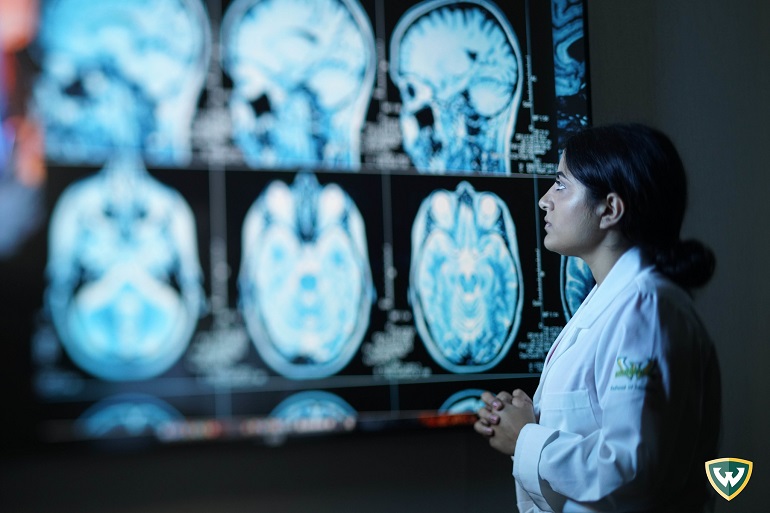
March is Women’s History Month, an annual declared celebration that highlights the contributions of women to events in history and contemporary society. The Wayne State University School of Medicine is home to countless outstanding women in medicine and science – physicians, teachers, researchers, mentors and more -- from both yesterday and today. Their contributions are endless and inspiring. It is also the site of several programs, offices and organizations born with the intent to support and enhance women’s health, leadership and education. While not a comprehensive list by any means, here are just a few examples from the School of Medicine’s 152-year history that deserve recognition in this month, and always.
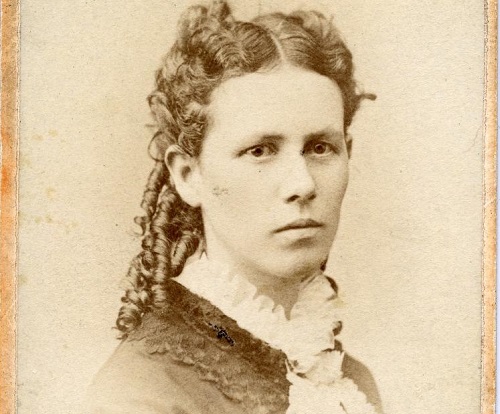
In 1881, 13 years after the School of Medicine opened, Anna Spencer Rankin, M.D., graduated from the Michigan College of Medicine, a precursor of the School of Medicine. She was the first woman to do so. She was elected vice president of the Michigan College of Medicine Alumni Association in 1883.
Five years later, 17 women from Detroit worked with Charles Devendorf, M.D., a faculty member and Harper Hospital physician and later chief medical officer for Children's Hospital of Michigan, to form the Children's Free Hospital Association, which provided beds and clothing for sick children regardless of race, religion or ability to pay.
In 1917, four years after the school was reorganized as the Detroit College of Medicine and Surgery, women were again officially admitted to the medical degree program – three years before women secured the right to vote.
In 1943, Marjorie Peebles, M.D., became the first African American woman to graduate from the College of Medicine. She also became the first African American female resident and chief resident at Detroit Receiving Hospital, and faculty member at the Wayne State University School of Medicine.
Marion Barnhart, Ph.D., a physiology instructor and hematology researcher, in 1951 became the first full-time female faculty member at what was then the College of Medicine. In 1967 she was promoted to professor, making her the first woman at Wayne State University to achieve that rank.
Dr. Barnhart specialized in blood platelet and blood clotting research, and made significant contributions to the treatment of sickle cell anemia. In the late 1960s, she was the first to use scanning electron microscopy to study the pathophysiology of many disease entities. She received the university's first Graduate Faculty Award in 1974. At the time of her death in 1985 at age 64 after a traffic accident in Flint, per The New York Times, Dr. Barnhart was director of the Academic Program in Transfusion Medicine, director of the Bargman Laboratory for Cell and Molecular Research, chair of the National Institutes of Health's Blood Diseases and Resources/Hemostasis Advisory Committee, and a charter member of Wayne State University's Academy of Scholars.
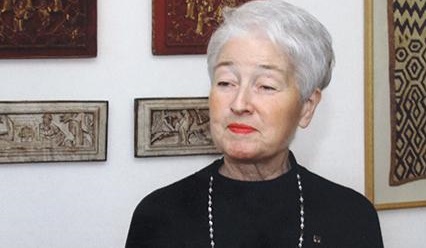
Jeanne Lusher, M.D., a colleague and mentee of Dr. Barnhart, joined the faculty in 1968 as an assistant professor of Pediatrics and staff hematologist at Children's Hospital of Michigan. Dr. Lusher retired from the School of Medicine in June 2013 after 44 years of service. She was a lifetime member of Wayne State’s Academy of Scholars, the highest honor bestowed on a faculty member.
She served as co-director of the Division of Hematology/Oncology and as medical director of the Special Coagulation Laboratory of Children’s Hospital of Michigan.
Her main research interests included the etiology and pathogenesis of inhibitor antibodies developing against FVIII, an essential blood-clotting protein. Dr. Lusher and a colleague were the first to document the antibody nature of these inhibitors in the late 1960s.
The Marion I. Barnhart-Jeanne M. Lusher Endowed Hemostasis Research Chair was established in 1988 to honor Dr. Barnhart's contributions to her field and to the School of Medicine.
In 1994, Bonnie Sloane, Ph.D., became the first female chair of a department in the School of Medicine. She served as chair of the Department of Pharmacology through 2015.
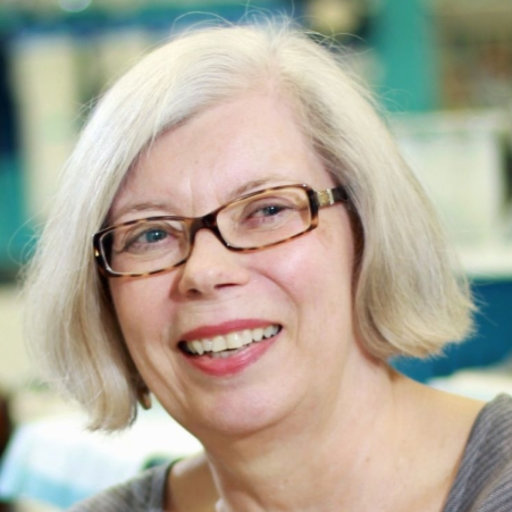
Dr. Sloane, a distinguished professor, also led the Barbara Ann Karmanos Cancer Institute’s Proteases and Cancer Program.
In addition to conducting her own proteolysis research, Dr. Sloane mentored many researchers, including international scientists. In 2017, the Department of Pharmacology, the School of Medicine and Karmanos Cancer Institute presented its first international symposium, “Proteases in Cancer Biology,” in tribute to Dr. Sloane. Her work in the field of proteolysis research earned Dr. Sloane a Lifetime Membership Award for outstanding contributions from the International Proteolysis Society in 2010. She served as president of the organization from 1999 to 2001, and on its council from 2003 to 2007.
In 2002, the National Institutes of Health approved a contract to house the Perinatology Research Branch at the School of Medicine. The branch, which focuses on maternal-fetal medicine and preterm birth, is the only NIH branch of its type located outside of Bethesda, Md. Eight years later, Professor of Obstetrics and Gynecology Sonia Hassan, M.D., working in the PRB, discovered that the daily use of progesterone by pregnant women found to have a shortened cervix via ultrasound reduces the rate of preterm birth by as much as 45 percent.
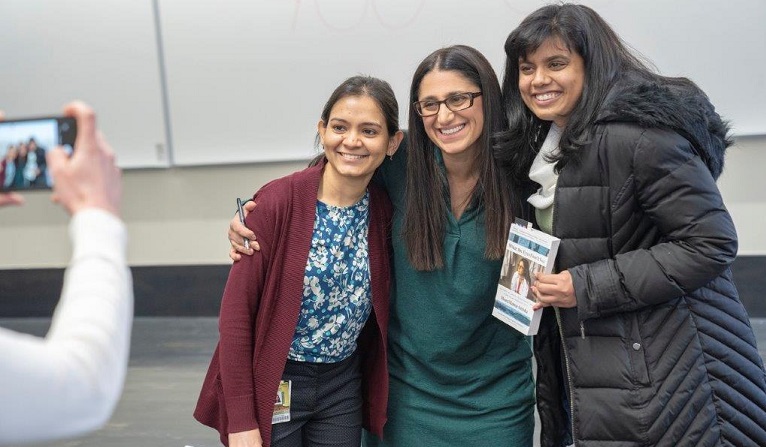
In 2006, Flint, Mich.-based pediatrician Mona Hanna Attisha, M.D., graduated from her Pediatrics residency at WSU and Children’s Hospital of Michigan, having served as chief resident since 2005. She made headlines in 2015 when she announced that the blood of children living in Flint and treated at Hurley Medical Center, where she practices, showed elevated lead levels due to contaminated water. She was named one of TIME Magazine's Most Influential People in 2015 and has since returned to the WSU School of Medicine to lecture on her role in the water crisis and her book, “What the Eyes Don’t See: A Story of Crisis, Resistance and Hope in an American City.”
The School of Medicine hired its first woman dean, in 2009. Valerie Parisi, M.D., M.P. H., M.B.A., is an obstetrician/gynecologist, and a national leader in medical education and in the evaluation and certification of physicians. She helped launch and served as co-principal investigator for a federal grant to establish an Area Health Education Center program in Michigan. She served as dean until 2014.
A year earlier, the organization Women in Medicine and Science, or WIMS was founded. The group works to advance women at all career levels by addressing gender equity, recruitment and retention, awards and recognition, work-life balance and career advancement. WIMS regularly hosts events open to all interested faculty, staff and students in academic medicine and science.
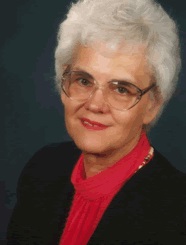
In 2014, Anna Ledgerwood, M.D., FACS, professor of Surgery, was inducted as the first female president of the American Surgical Association. She joined the faculty in 1972 and served as trauma director for Detroit Receiving Hospital, and a trauma site visitor to verify hospitals as trauma centers for the American College of Surgeons. She was a frequent guest lecturer at other medical schools and has a special interest in promoting women in the field of surgery.
WSU launched the Make Your Date Program the same year to reduce the rate of preterm birth in Detroit. The comprehensive outreach effort has provided services to between 1,000 and 1,500 pregnant women in Detroit each year. The program provides education, one-on-one counseling, access to insurance, the latest tests and treatment, and referrals to numerous services. A 2019 study showed that women served by Make Your Date were 37% less likely to deliver at less than 32 weeks and 28% less likely to deliver at less than 34 weeks than women delivering at the same hospital who had not participated in the program.
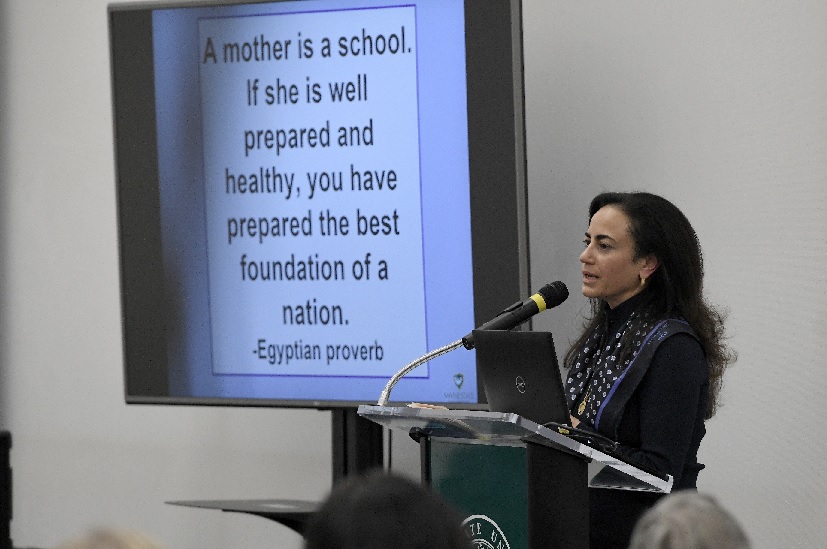
In December 2019, the university launched the Office of Women’s Health, a comprehensive approach that Dr. Hassan, now associate vice president of Women’s Health, founded to improve the health of women overall, through a deep dive into medical research affecting more than half the population of Michigan and the nation, a segment often unintentionally overlooked in research. The office works to improve the health of women to maximize the opportunity for families to thrive and achieve economic security. It also empowers women to lead their healthiest lives through all stages of life by implementing five core pillars: education outreach, research and development, the implementation of science, working to place more women in scientific research and helping to develop policy.
The School of Medicine opened a Maternal Support Room within Scott Hall, coinciding with National Breastfeeding Awareness Month. Room 2103, the first of its type on the medical campus, was celebrated with an Aug. 10, 2020, ribbon-cutting ceremony that included Dean Mark E. Schweitzer, M.D., and those who worked to secure the facility. Based on insights derived from a student-led study, including data from working and student mothers and an investigation of lactation spaces available at WSU, the study was released in conjunction with the opening of the new room. Understanding the difficulty mothers face as they endeavor to nurse for their infant’s health while working or completing their education, students and faculty associated with the study acted on their findings and presented the need for additional lactation and nursing spaces.